VABBS
HomeAbout VABBS
Members
Events
News Archive
What is a Brass Band?
Research Project: History of Brass Bands in BC
Links
Little Mountain Brass BandBrass Belles
Other Links
Contacts
Brian StrideJim Littleford
Web Administrator
Research Project: History of Brass Bands in British Columbia
Brass Bands of the European Colonists and Settlers
Much of this article is summarized from the following publication:
McIntosh, D. (1989). History of Music in British Columbia 1850 – 1950. Victoria: Sono Nis Press
Note: This article refers to brass bands outside of the Salvation Army movement.
Much of our present banding tradition has its roots in the brass band movement that started in the mid 1800's in Great Britain. With British Columbia being a British colony most of the original colonists, settlers and workers came from Great Britain. They brought with them their brass band traditions, with its standardized instrumentation and culture of contesting. This is especially true of those coming from the Yorkshire mining regions.
For many communities, the town band was the only source of musical expression. This was especially true of isolated resource-based communities. While orchestras and other ensembles were formed in larger cities, small towns relied on their brass bands for much of their music. The primary function of these early groups was to lead parades, play in the town bandstand and on street corners and to provide music at special events.
Contesting, the life-blood of the British brass band movement, was exceedingly difficult, due to the large distances that bands were required to travel. The financial and time commitments were prohibitive. Consequently, contests tended to be one-on-one affairs to see which town's band was better. There were larger contests, but they were small in comparison to their counterparts in Great Britain.
Some Brass Band Data
The band with the longest recorded history in British Columbia, the Nanaimo Concert Band, was originally the Nanaimo Brass Band. Founded in 1872 by Reverend James Reynard it gradually evolved into the present day concert band.
The longest-lived brass band was the Trail Brass Band, formed in the late 1800's and disbanded in 1976.
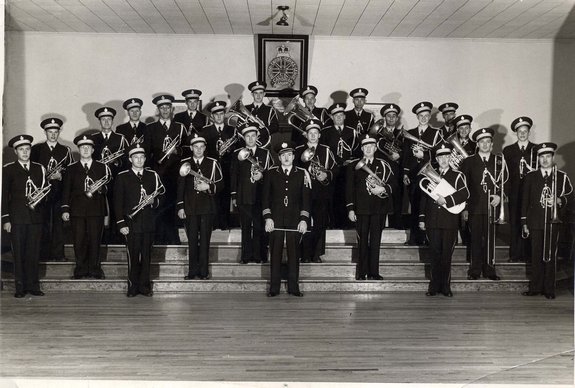
Trail Brass Band, c. 1949
Photo courtesy of W. Barrett
In 1895 the Inland Cigar Company of Kamloops formed the Inland Cigar Company Band. This is the only instance in British Columbia of a company sponsored band, following the format of company sponsored brass bands in Great Britain. Unfortunately, when the company closed down in 1900, so did the band.
The Vancouver area had its own brass bands, and a photograph survives of the first Vancouver Brass Band.
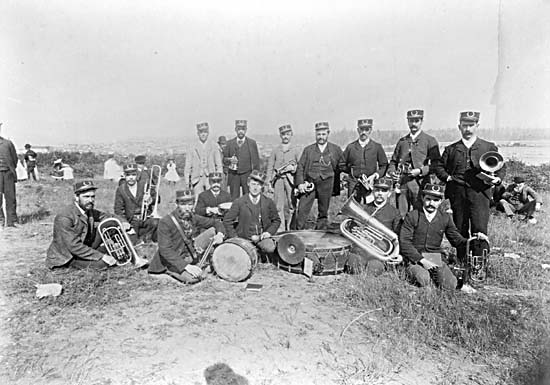
City of Vancouver Archives, Park N4
Vancouver's First Brass Band, c. 191-
The Disappearance of the Brass Band
The influx of people from different cultures with different musical traditions, linked to the shortage of brass players, gradually lead to the introduction of non-brass instruments into these ensembles. Initially, these were in the form of one or two clarinets or the occasional saxophone within a brass band ensemble. Photographs from the era show the unquestionable brass band instrumentation of cornets, euphoniums and saxhorns, but in the midst of these instruments can be seen a lone clarinet player. Over time the availability of reed and flute players, along with the shortage of brass players (especially amongst the more specialized instruments such as soprano cornet) resulted in these groups changing into concert bands. Some brass bands did not change and disappeared altogether.
A graphic portrait of the change from brass band to concert band can be seen in the following three photographs of the Vernon Fire Brigade Band, spanning the years 1901 - 1911.
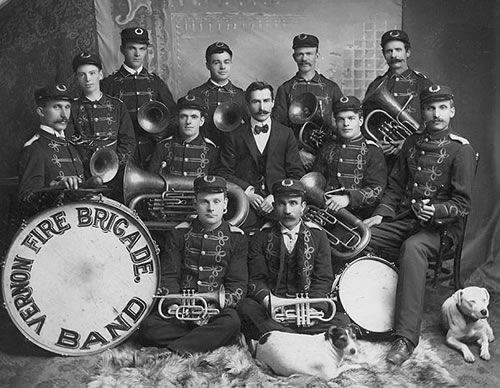
Greater Vernon Museum & Archives, 223
The Vernon Fire Brigade Band, c. 1901. A small brass band.
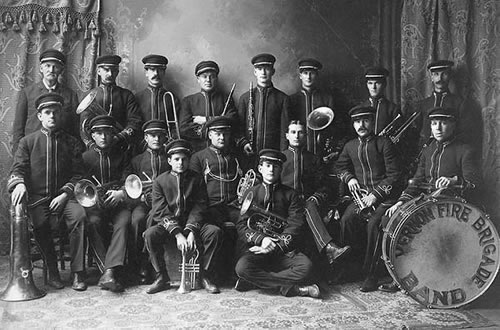
Greater Vernon Museum & Archives, 1189
The Vernon Fire Brigade Band, c. 1906. The brass band now has two clarinets.
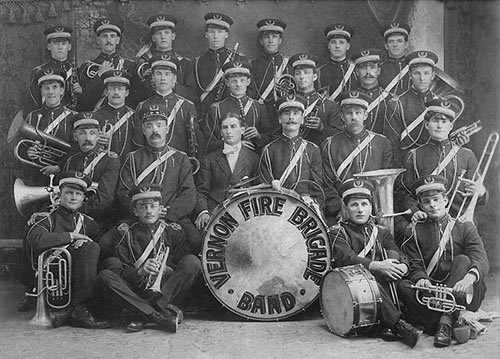
Greater Vernon Museum & Archives, 1928
The Vernon Fire Brigade Band, c. 1911. The brass band is now a concert band.
The difficulties associated with contesting may have been one of the primary reasons for the North American phenomenon of the disappearance of brass bands. Contesting appears to be the "life-blood" of the brass band movement in Great Britain. Often referred to as "music as sport" it has cultivated a drive for excellence in performance and has generated a vast repertoire of music (through commissions for contests). Many of these commissions become transcribed into the concert band repertoire. Philip Sparke's "Year of the Dragon", a well-known albeit difficult concert band score, was initially written for a brass band. Commissioned by the Cory Brass Band of Wales to celebrate their consecutive wins at the National Brass Band Championships of Great Britain, the work has subsequently been arranged for concert band.
World War I had a tremendous impact on banding in this province, whether they were brass or concert bands. Many banding lives were lost in the Great War, and some bands, such as the Royal City Band, ceased to exist as a result of the loss of most of their players.
Like other extinction theories, there is probably no one theory that can explain the phenomenon. Loss of players due to the Great War, difficulty contesting, and the influx of other musical cultures probably all combined to bring about the demise of the brass band and its consequent replacement by the concert band.
Recent attempts to Re-start the Brass Band Movement
There have been a few attempts to start brass bands in the Lower Mainland, with all except one failing after one or two years. In the late 1970's Reg Titcomb, working with the Rotary Clubs, attempted to develop a brass band in East Vancouver. In the early 1980's a brass band ran for about two years out of Branch 177 of the Royal Canadian Legion. In the 1990's the Cambie Street Brass Band flourished and then disbanded.
To the author's knowledge, the only brass band that continues to operate is the Little Mountain Brass Band, conducted by Jim Littleford. Founded in 1995, the band continues to promote the music of the brass band.
In Search of Our History
The Vancouver Area Brass Band Society continues to search out information on brass bands in the province of British Columbia. If you have photographs, stories or other things you would like to share please contact Brian Stride by email: bstride@shaw.ca.
Hidden Treasures
Many bands have copies of brass band scores lingering, unplayed, in their libraries. The Vancouver Area Brass Band Society offers to give such scores a good home. The Little Mountain Brass Band may play the music, and offers to make such music available to other brass band groups that may wish to start up in British Columbia.
Author: Brian Stride (2006)
Updated 2007 Jan 06, 18:21 EST/EDT


